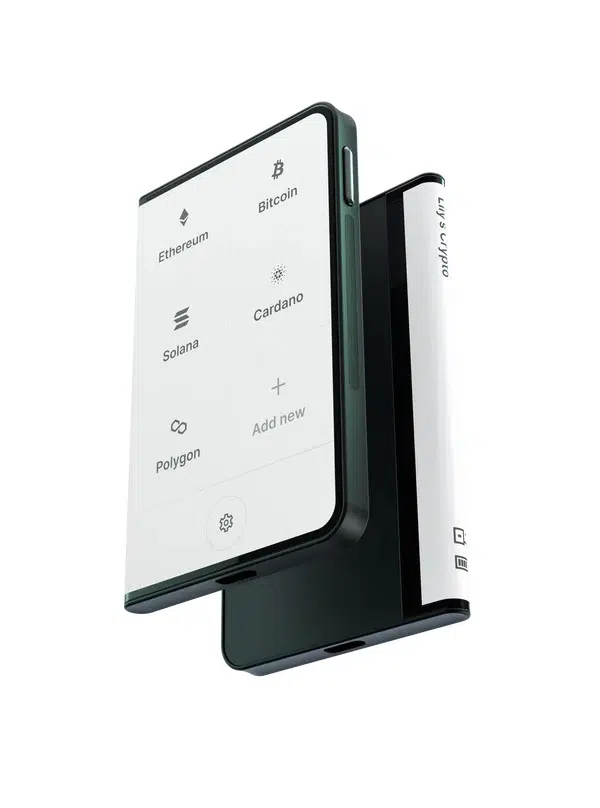We had an insightful and very special interview with Adrien Faguet, Developer Relations at Ledger, at the ETHPorto hackathon and networking event in Portugal. During the communication with buidlbee.com, the Ledger team representative revealed some important upcoming events, talked about the features of “cold” wallets and whether they are realistic to hack, shared security tips, and his vision of the role of authorities’ regulation in the crypto market.
What is Ledger?
Ledger is a company that produces hardware or “cold” wallets for storing and managing cryptocurrency assets securely. Ledger’s wallets incorporate a Secure Element chip that stores private keys and makes the device invulnerable to hacking attacks. The company is a major player in the cryptocurrency industry, with a market share of around 80% in global crypto sales and 30% in global NFT sales.
Q. So basically, there is only one big competitor for Ledger in the market, and that is Trezor. What are the main differences between Ledger and Trezor?
A. Although Ledger owns most of the market, there is competition. Trezor offers a similar product, but their product lacks a Secure Element which is present in the Ledger. This Secure Element makes the device invulnerable to hackers accessing the private key, which is not the case with other products. Other products, such as MetaMask, Japalura, and Phantom, are non-physical wallets that people trust but have a history of getting hacked, resulting in people losing their money.
The brand new newsletter with insights, market analysis and daily opportunities.
Let’s grow together!
Q. Do people from Trezor try to break Ledger wallets?
A. Hackers and Trezor’s own team have tried to break into Ledger’s wallet to find vulnerabilities. Ledger has a team called “The Dungeon,” which attacks its own product to ensure its safety. No vulnerabilities have been found so far. This process is crucial for improving the product.
Q. Back in 2020, hackers stole your client’s database. After that, there were many attacks on Ledger’s users, like phishing. How is it going now?
A. I have very good news: Recently, the people behind these attacks got arrested. There was one French guy. I didn’t read the full disclosure of the paper. There were like four people, I guess. I’m not sure if it was a direct attack on Ledger, but disclosing it is an attack. I don’t know their plans: whether they wanted to sell data, make money on it, or just do phishing with it.
Q. Can you give some advice on security?
A. Don’t open suspicious links or give your seed phrase to ANYONE.
Q. If you need clarification, ask for help from official support channels rather than relying on social media.
A. Be careful of bots and scams that may appear legitimate. Stick to the official website for support. Stay safe!
Q. How safe is Ledger?
A. Physical breaks could destroy the devices, but crypto would still be safe because it’s on the blockchain. Just don’t lose your seed phase. Then you just buy another device and get your crypto back. If you think your seed phrase is compromised, just create another one and move the funds to another device.
Q. There is an urban legend that the FBI can take your physical wallet; they have a special machine engine that can access your private keys. Is this theoretically possible?
A. Literally, they cannot have access. The only way they can do this is to find your PIN code, because when you have your Ledger, to open it you need to enter the PIN code.
However, the Secure Element in the device prevents unauthorized access and erases all data if breached. So, it’s theoretically impossible to access the private keys, and no one has ever done it before.
Q. EU authorities are thinking of identifying the owners of crypto wallets. Can authorities identify the owners of crypto wallets – like Ledger – through KYC (Know Your Customer – personal identification)?
A. Unlike exchanges, Ledger offers safe custody without requiring KYC. You only need the 24-word passphrase to generate an address. Currently, there’s no way for authorities to identify Ledger owners, but that may change in a few years due to government regulations. If the government imposes KYC on Ledger, we’ll have to oblige. In the future, Ledger may offer features like identity verification and passport storage to comply with regulations without compromising user privacy. This way, users can prove their identity without revealing their wallet addresses.
Q. What do you think of the government’s attempts to regulate crypto? Is it good or bad for the industry?
A. Regulation can be good for the industry by attracting more people and making it more secure. However, the government needs to understand the technology and do it the right way. Some regulations are well-intentioned but poorly executed. Governments tend to overregulate and control, which can cause problems like those in the banking industry. Something we don’t want in crypto.
Q. Do you have some insights on Ledger?
A. We have two big things coming for this year. The first is account abstraction technology, which we’re developing to create a new wallet that’s easier for people to use. This technology will be powered by StarkNet. The second development is a new device, the Ledger Stax, with a bigger screen and available in white, black, and blue colors. With this device, you can store and view NFTs and review contracts before signing. We plan to release it in the middle of the year. Tony Fadell, the creator of Apple’s iPod and co-founder and former CEO of Nest, did the design for the Stax. The device will cost around $250.







